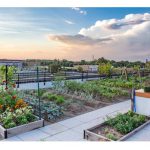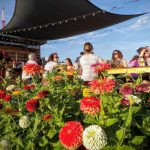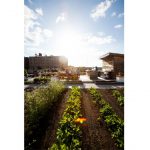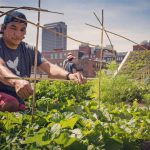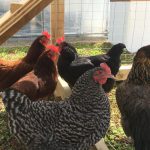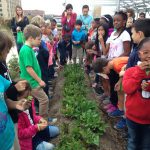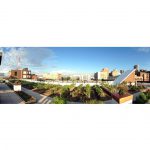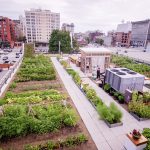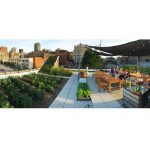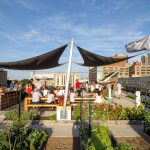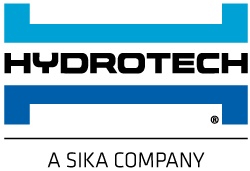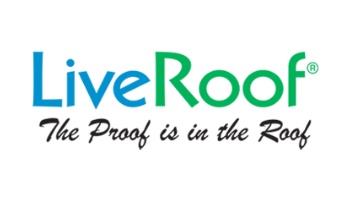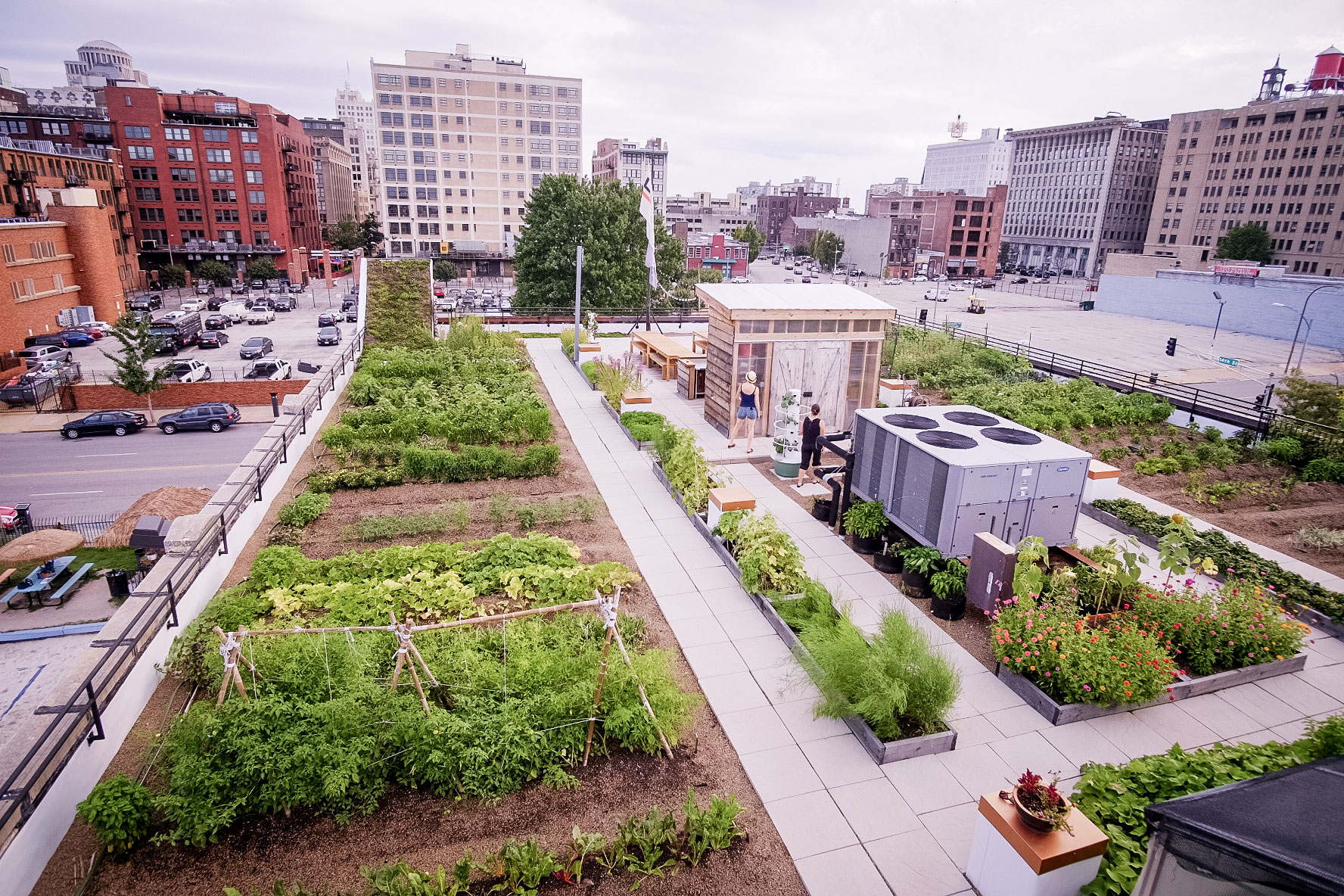
Additional Resources
FOOD ROOF Farm is located at 1335 Convention Plaza, St Louis, MO 63103; visit their website and following pages: Instagram; Facebook; and Twitter. Watch the 2:44 FOOD ROOF Farm – Project of the Week 3/19/18 video from Greenroofs.com on the greenroofsTV channel on YouTube. Greenroofs.com Project of the Week video photo credits: All courtesy of Urban Harvest STL (C) by: Eldar Beiseitov, Christopher Faller, Jonathan Gayman, and Urban Harvest STL.
See these videos: The 16:48 TEDx Talk Grow Food Where We Live by TEDx GatewayArch, and the 5:16 SciTech Now | Episode 203 | Food Roof Farm by Nine Network, both on YouTube; and the 2:46 Urban Harvest STL- Food Roof Marketing Video by Suede Media Co on vimeo. Read the May 27, 2016 St. Louis’ First Rooftop Farm Grows Food and Opportunity Downtown by Heather Riske in Feast; December 31, 2015 FARMER ON THE ROOF by Tatiana Petukhova in eRazvitie.org; July 1, 2015 Rooftop Farm Aims To Help Revitalize Downtown St. Louis And Bridge Community Divides by Joseph Erbentraut in The Huffington Post; July 4, 2015 Food Roof gives farming a lift � near downtown St. Louis by Tim Barker in the St. Louis Post-Dispatch; and the June 30, 2015 In St. Louis, an Urban Farmer Uses a Rooftop and Food to Spur Renewal by Joe Gose in The New York Times.
Read about the following companies in The Greenroof & Greenwall Directory: Sika Sarnafil, Bison Innovative Products, and Optigrun international AG / Optigreen. For additional information on the FOOD ROOF Farm and for design and installation consulting, contact Mary Ostafi, AIA, LEED-AP, Founder and Executive Director, Urban Harvest STL at: urbanharveststl@gmail.com.
Urban Harvest STL, a St. Louis nonprofit, empowers communities to cultivate equitable access to healthy, sustainably grown food and enhance biodiversity in cities. We envision vibrant cities where under-utilized spaces are transformed into productive urban farms addressing the need for equitable access to healthy food for all. Our community-based agricultural projects restore natural ecosystems, stimulate biodiversity, and educate and engage people of all ages to create stronger, more nourishing bonds with each other – and with nature.
After years of gardening on the ground in downtown St. Louis and being displaced from location to location with no ability to secure a long-term lease, this group of grassroots activists set their sights higher, to rooftops. The founders combined their background in architecture with their experience in urban agriculture to design and build St. Louis’s first rooftop farm, the FOOD ROOF Farm.
Built in 2015, the FOOD ROOF Farm is located in the heart of downtown St. Louis above a two-story storage facility. The site provides full sun exposure necessary for growing edibles, and the structure of the 1927 building did not require reinforcement for the addition of an intensive green roof system – both were determining factors in the selection of this property.
This rooftop exhibits a robust green roof infrastructure that captures up to 17,000 gallons of stormwater per storm event, which equates to over 1,819,000 gallons annually. Rainwater captured is utilized for plant growth, reducing irrigation needs by up to 50%.
At the FOOD ROOF Farm we are growing healthy food and a community of healthy people. Community engagement drove the design of the space featuring a community hub space front and center where we host various events, educational workshops, and activities throughout the year.
We built a strong team of volunteers to help us build the farm as well as a network of partner organizations who help us distribute the healthy food we grow directly into the hands of people who do not have access to healthy food options; many are struggling with homelessness or live in food deserts just blocks from our farm.
We set out to not only create a social impact but also create an ecological return as well; we are increasing biodiversity gains and pollinator health on our rooftop.
The 8,500 square feet rooftop was transformed into an urban farm between March – June 2015. With additional greenroof consulting and design services from Hanging Gardens, the farm was built in conjunction with volunteers under the leadership of Urban Harvest STL.
The FOOD ROOF Farm leveraged a hybrid Intensive green roof system designed specifically for stormwater management and agriculture. The green roof consists of the following:
– Sika Sarnafil PVC waterproofing membrane which doubles as a root barrier;
– Optigrun international AG / Optigreen Capillary Fleece (500k) and RMS 900 (Protective Fleece) of polyester thread which protect the waterproofing membrane and maximizes water holding capacity of the system;
– Optigrun international AG / Optigreen 2.4″ Intensive High Load Drainage/Retention (HLDR) Boards (FKD-25 and FKD-60 UK) store water on intensive roof. The entire roof system prevents 17,164.5 gallons of stormwater runoff from entering the city’s combined sewer system per storm event, equivalent to mitigating the entirety of a 3″ storm on site;
– Optigrun international AG / Optigreen Filtermat-105 Filter fabric/fleece;
– Growing medium is an engineered blend mixed locally by St Louis Composting. 76 tons of soil was hauled up to the roof in super sacks. 46.53 lbs. per square foot water holding capacity at 8″ depth of growing medium. Engineered blend of lightweight aggregate, compost and worm castings.
Notable features of the project:
– Grows over 250 varieties of vegetables, fruits, herbs and flowers.
– Increases pollinator health with habitat for over 40,000 honeybees.
– Nurtures 5 chickens with farm fresh farm scraps in return for eggs and fertilizer.
– 150th Milkweed for Monarchs pollinator garden in St Louis.
– Hosts over 20 community events each year.
– In 2017 grew over 4,000 pounds of organically produced food. Donates the majority of the harvest to people who need it the most in the community.
– Illustrates various rooftop farming growing techniques including intensive greenroof, hydroponic towers, raised beds, modular planters and greenhouse and tracks best practices for growing each crop efficiently.
The project has been internationally recognized and was awarded the INUAg (Innovators in Urban Agriculture) Prize in 2015. In addition, the St. Louis ASLA Chapter honored Urban Harvest STL with the Community Stewardship Award in 2016.
 Greenroofs.comConnecting the Planet + Living Architecture
Greenroofs.comConnecting the Planet + Living Architecture
